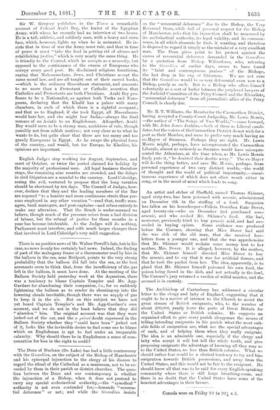Sir W. Gregory pnblisbes in the Times a remarkable account
of Colonel Arabi Bey, the leader of the Egyptian Army, with whom he recently had an interview of two hours. He is a tall, athletic, and soldierly man, with a heavy and stern face, which, however, lights up when he is animated. He in- sists that in time of war the Army must rule, and that in time -of peace it must "take the lead in getting rid of abuses and establishing justice," which is very nearly the same thing. He is friendly to the Control, which he accepts as a necessity, but opposed to the continuance of the swarm of Europeans who occupy every good post. He disclaimed religious fanaticism, saying that Mahommedans, Jews, and Christians accept the same moral law, and are all taught out of their• sacred books, —which is the ordinary Mussulman statement, and amounts to no more than a Protestant or Catholic assertion that Catholics and Protestants are both Christians. Arabi Bey pro- fesses to be a Nationalist, as against both Turks and Euro- peans, declaring that the Khalif has a palace with many chambers, in each of which there is a rightful occupant ; and that as to England, if she took Egypt, all Mussulmaus would hate her, and she might lose India,—always the final menace of an Asiatic to an Englishman. Altogether, Arabi Bey would seem to be a strong mau, ambitious of rule, though .possibly not from selfish motives ; not very clear as to what he wants to do, but quite clear that there are too many and too greedy Europeans in Egypt. As he sways the physical force -of the country, and would, but for Europe, be Khedive, his -opinions are important.






































 Previous page
Previous page